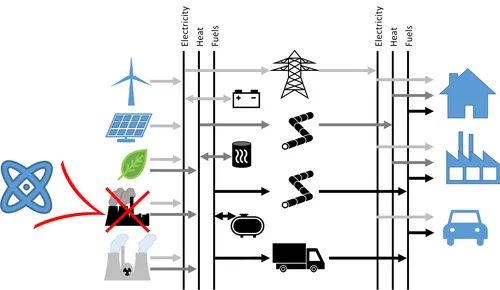The role of Nuclear Fusion in European Energy Systems in the Second Half of the 21th Century
| Partners | Max-Planck-Institute for Plasma Physics |
| Funding | Max Planck Institute for Plasma Physics |
| Duration | Phase I: April 2017 until September 2018 Phase II: April 2019 until March 2020 Phase III: March 2020 until March 2023 Phase IV: April 2023 until March 2026 |
| Contact | Andelka Kerekes, Larissa Breuning |
Overview of the research project role of nuclear fusion
To reach climate policy objectives, emissions in all sectors have to be reduce – especially in the power, heating and traffic sector. Currently, the extension of renewable energies is the basis for achieving these objectives. However, alternative technologies, which are still in the process of development can play an important role in the future. One of these technologies is nuclear fusion, which is, inter alia, investigated at the Max-Planck-Institute for Plasma Physics.
In recent years, the focus has been on the power sector on a national as well as on an European level. Thus, different trajectories for the share of renewable energies has been defined. Assuming that in a long-term perspective the power generation is based on emission-free technologies a link between the heating and traffic sector with the power sector is reasonable. However, the substitution of fossil fuels through electricity automatically results to an increase in power demand. Thus, in a future emission-free energy system the demand of electricity depending on renewable energies – in particular wind power and solar energy – is composed by the demand of electricity, heat and mobility.
To ensure both sufficient energy supply and long-term power system the system has to become more flexible. In recent years, several studies have been conducted investigating emission-free or low-emission energy systems until 2050. Against the background of current developments, the overall achievement of climate objectives appears unlikely. Thus, the horizon must be extended until 2100 and technologies which might be available have to be taken into account. Nuclear fusion is one of these potential technologies. Due to its properties – emission-free, safety and controllability – fusion is expected to be a useful complement to a renewable based energy system.
Within this project the role of nuclear fusion will be investigated in more detail, especially regarding economic and technical conditions. Within the first project period the focus was on the framework, which includes the characterization of a future energy system, the derivation of scenarios and the modeling of central components. On this basis, first general statements about nuclear fusion and its role in future energy system were made. In the following second period, selected aspects will be deepening. In the focus is the implementation of fusion-specific power plants processes as well as the cross-sector processes.
